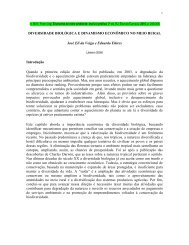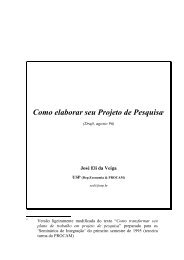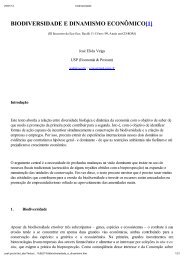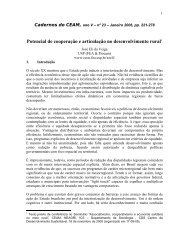sustainable development 20 years on from the ... - José Eli da Veiga
sustainable development 20 years on from the ... - José Eli da Veiga
sustainable development 20 years on from the ... - José Eli da Veiga
Create successful ePaper yourself
Turn your PDF publications into a flip-book with our unique Google optimized e-Paper software.
101<br />
In recent <str<strong>on</strong>g>years</str<strong>on</strong>g> <strong>the</strong>re have been some successful experiences with policy coordinati<strong>on</strong> through<br />
committees and o<strong>the</strong>r means of grouping instituti<strong>on</strong>s, which bring toge<strong>the</strong>r a number of government<br />
entities to address specific issues. Examples include <strong>the</strong> Inter-ministerial Commissi<strong>on</strong> <strong>on</strong> Climate<br />
Change (CICC) in Mexico (see chapter VI) and <strong>the</strong> Nati<strong>on</strong>al Sustainable Development Commissi<strong>on</strong><br />
in Barbados.<br />
There have also been some noteworthy experiences in <strong>the</strong> regi<strong>on</strong> relating to coordinati<strong>on</strong> of<br />
acti<strong>on</strong>s am<strong>on</strong>g different political units. In Brazil, <strong>the</strong> C<strong>on</strong>stituti<strong>on</strong> provides that states may group<br />
toge<strong>the</strong>r to form metropolitan regi<strong>on</strong>s, urban agglomerati<strong>on</strong>s and microregi<strong>on</strong>s to carry out public<br />
functi<strong>on</strong>s of comm<strong>on</strong> interest. In additi<strong>on</strong>, <strong>the</strong> law defining <strong>the</strong> nati<strong>on</strong>al policy <strong>on</strong> water resources<br />
stipulates that <strong>the</strong> river basin —as opposed to <strong>the</strong> municipality— is <strong>the</strong> territorial unit resp<strong>on</strong>sible for<br />
implementing this policy and creates river basin committees to that end. A <str<strong>on</strong>g>20</str<strong>on</strong>g>05 law also provides for<br />
<strong>the</strong> possibility of establishing inter-municipal c<strong>on</strong>sortiums for <strong>the</strong> management of certain matters.<br />
These include <strong>the</strong> inter-municipal c<strong>on</strong>sortium for <strong>the</strong> <str<strong>on</strong>g>sustainable</str<strong>on</strong>g> <str<strong>on</strong>g>development</str<strong>on</strong>g> of <strong>the</strong> trans-Amaz<strong>on</strong>ian<br />
and Xingu regi<strong>on</strong>s (IPAM, <str<strong>on</strong>g>20</str<strong>on</strong>g>11). Ano<strong>the</strong>r noteworthy initiative is <strong>the</strong> municipal partnerships in<br />
Colombia (see chapter III).<br />
2. Experience with <strong>the</strong> use of ec<strong>on</strong>omic instruments for envir<strong>on</strong>mental management<br />
Since <strong>the</strong> 1990s, several countries in <strong>the</strong> regi<strong>on</strong> have introduced ec<strong>on</strong>omic instruments to complement <strong>the</strong><br />
direct regulati<strong>on</strong> strategies that characterize <strong>the</strong> envir<strong>on</strong>mental legal framework. These instruments<br />
include taxes, charges for <strong>the</strong> use of natural resources and <strong>on</strong> emissi<strong>on</strong>s, subsidies, tax credits, fiscal<br />
incentives and special financial facilities for activities with positive envir<strong>on</strong>mental externalities, tra<strong>da</strong>ble<br />
permits and certificati<strong>on</strong>.<br />
However, an analysis of <strong>the</strong>se experiences has shown that envir<strong>on</strong>mental authorities have<br />
encountered a number of barriers in implementing <strong>the</strong>se instruments, including unfavourable instituti<strong>on</strong>al<br />
envir<strong>on</strong>ments and public policy coordinati<strong>on</strong> problems (Acquatella, <str<strong>on</strong>g>20</str<strong>on</strong>g>01; Acquatella and Bárcena, <str<strong>on</strong>g>20</str<strong>on</strong>g>05).<br />
A high percentage of <strong>the</strong> ec<strong>on</strong>omic instruments developed were implemented for <strong>on</strong>ly a short time or not<br />
at all (Acquatella, <str<strong>on</strong>g>20</str<strong>on</strong>g>09).<br />
Two of <strong>the</strong> factors that may have influenced <strong>the</strong>se outcomes are: (i) limited cooperati<strong>on</strong> <strong>from</strong><br />
fiscal authorities and (ii) <strong>the</strong> high transacti<strong>on</strong> costs involved in coordinating <strong>the</strong> implementati<strong>on</strong> of<br />
ec<strong>on</strong>omic instruments across bureaucratic sectors (tax and envir<strong>on</strong>mental authorities) and levels of<br />
government (central envir<strong>on</strong>mental authorities and municipal, provincial or o<strong>the</strong>r authorities)<br />
(Acquatella, <str<strong>on</strong>g>20</str<strong>on</strong>g>09). Two patterns are in evidence: <strong>the</strong> emergence of resistance within <strong>the</strong> tax system to<br />
<strong>the</strong> introducti<strong>on</strong> of envir<strong>on</strong>mental goals and <strong>the</strong> existence of incentives that undermine <strong>the</strong> effectiveness<br />
of envir<strong>on</strong>mental incentives.<br />
It is difficult, in practice, to implement ec<strong>on</strong>omic instruments aligned with envir<strong>on</strong>mental goals<br />
and to integrate <strong>the</strong>m into existing fiscal structures and sectoral policy incentives (such as energy,<br />
transport or agriculture). The ec<strong>on</strong>omic incentives that envir<strong>on</strong>mental regulators can manipulate directly<br />
are relatively modest signals. If <strong>the</strong> underlying fiscal structure determining end-user costs is stacked in <strong>the</strong><br />
opposite directi<strong>on</strong>, <strong>the</strong>re is little possibility of installing a net marginal effect that can functi<strong>on</strong> as an<br />
effective envir<strong>on</strong>mental incentive.













